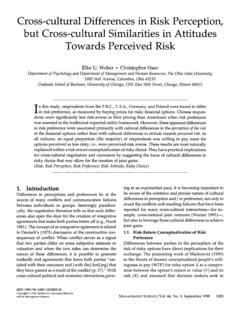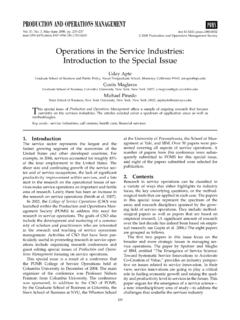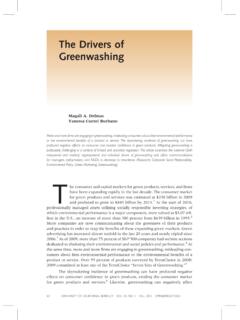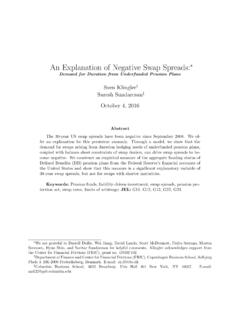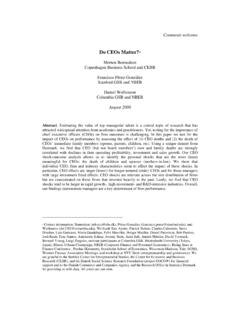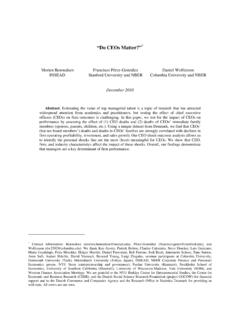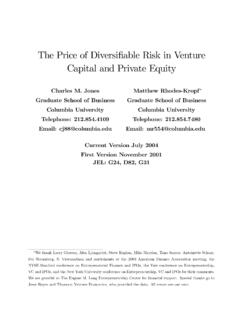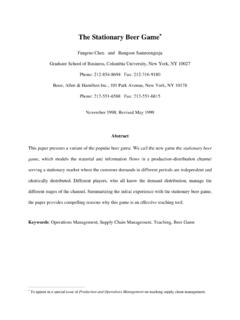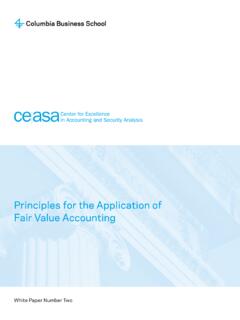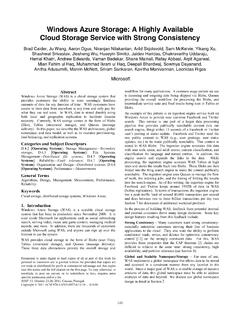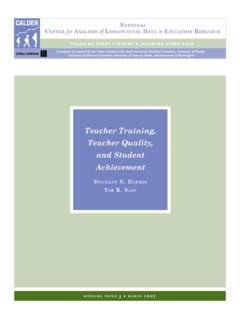Transcription of School Principals and School Performance
1 School Principals and School PerformanceDamon Clark, PaCo martorell, an D Jonah roCkoff working paper 38 december 2009 School Principals and School Performance Damon Clark University of Florida Paco Martorell RAND Jonah Rockoff Columbia Business School Corresponding authors: Damon Clark, University of Florida, Email: Paco Martorell, RAND, Email: Jonah Rockoff, Columbia Business School , Email: ii The research presented here has benefited from suggestions and comments from members of the Cahn Fellows Program, the New York City Leadership Academy, and the New York City Department of Education.
2 The authors are grateful to Laurel Wheeler and Julia Zhou who provided excellent research assistance, and for support from the National Center for Analysis of Longitudinal Data in Education Research (CALDER), supported by Grant R305A060018 to the Urban Institute from the Institute of Education Sciences, Department of Education. CALDER working papers have not gone through final formal review and should be cited as working papers. They are intended to encourage discussion and suggestions for revision before final publication. The Urban Institute is a nonprofit, nonpartisan policy research and educational organization that examines the social, economic, and governance problems facing the nation.
3 The views expressed are those of the authors and should not be attributed to the Urban Institute, its trustees, or any of the funders and organizations. All errors are those of the authors. CALDER, The Urban Institute 2100 M Street , Washington, 20037 202-261-5739 Contents Page Abstract iv Introduction 1 Policy and Evidence 3 principal Promotion and Retention Policies 3 Evidence on principal Characteristics and School Performance 5 Identifying the Effects of principal Characteristics 7 Data
4 12 Descriptive Statistics 15 Results from Regression Analysis 18 Additional Analyses of Prior Experience and the Aspiring Principals Program 23 Discussion of Results 26 Do Inexperienced Principals Hurt School Performance .
5 A Natural Experiment 28 Conclusion 30 References 32 Data Appendix 34 Figures and Tables 36 iii iv School Principals and School Performance Damon Clark, Paco Martorell, and Jonah E. Rockoff CALDER Working Paper No. 38 December 2009 Abstract We use detailed data from New York City to estimate how the characteristics of School Principals relate to School Performance , as measured by students standardized exam scores and other outcomes.
6 We find little evidence of any relationship between School Performance and principal education and pre- principal work experience, although we do find some evidence that experience as an assistant principal at the principal s current School is associated with higher Performance among inexperienced Principals . However, we find a positive relationship between principal experience and School Performance , particularly for math test scores and student absences. The experience profile is especially steep over the first few years of principal experience. Finally, we find mixed evidence on the relationship between formal principal training and professional development programs and School Performance , with the caveat that the selection and assignment of New York City Principals participating in these programs make it hard to isolate their effects.
7 The positive returns to principal experience suggest that policies which cause Principals to leave their posts early ( , via early retirement or a move into district administration) will be costly, and the tendency for less-advantaged schools to be run by less experienced Principals could exacerbate educational inequality. 1 School Principals and School Performance Introduction State and local School accountability systems have become widespread, in part due to requirements of the federal No Child Left Behind legislation. The focus on schools, as opposed to School districts or teachers, presupposes that School -level policy decisions matter.
8 These decisions are, in large part, determined by School Principals , who have an important influence on the composition of the School workforce and course content, and who are responsible for monitoring the quality of instruction delivered by teachers. However, in contrast to the large literature on teacher quality (Rivkin, Hanushek, and Kain 2005; Rockoff 2004; Harris and Sass 2006; Kane, Rockoff, and Staiger 2008; Buddin and Zamarro 2009), few studies have addressed whether Principals impact School Performance and, if they do, which principal characteristics determine principal effectiveness. The literature on Principals is sparse in part because of the difficulties faced in defining and measuring principal effectiveness and in part because of the paucity of high-quality data on which convincing empirical strategies can be based.
9 In this paper we present new evidence on the relationship between principal characteristics and School Performance using data from New York City Department of Education (hereafter NYC). There are a number of reasons why NYC is an especially attractive setting to study these relationships. First, it is the largest School district in the nation and employs well over 1,000 Principals . Second, nearly all of its Principals are hired from within the School system, and we have detailed information on their entire career as educators in NYC. Third, for elementary and middle schools, on which we focus, we have data on student outcomes covering eight School years, which allows us to examine how School Performance varies over a principal s career and how it changes when schools change Principals .
10 Fourth, since our data is at the student level, we can estimate models of School Performance that control for student characteristics in a very flexible manner. A fifth reason to be interested in NYC is that, in 1991, the city implemented an unusual policy that generated quasi-experimental variation in principal characteristics across schools. We describe this program in 2 detail here, though our analysis of this experiment is ongoing. We use a variety of empirical strategies to estimate the relationship between principal characteristics and School Performance . These strategies are non-experimental, and identify the causal effects of principal characteristics on School Performance only under certain identifying assumptions which we make clear below.
